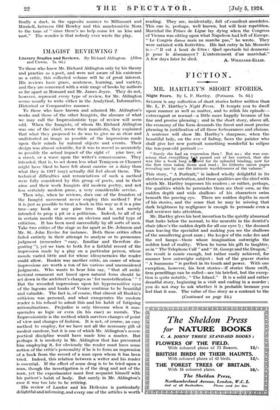IMAGIST REVIEWING
To those who knew Mr. Richard Aldington only by his theory and practice as a poet, and were not aware of his existence as a critic, this collected volume will be of great interest. His reviews have grace, acuteness, learning, and variety, and they are concerned with a wide range of books by authors so far apart as Ronsard and Mr. James Joyce. They do not, however, represent every type of review, for Mr. Aldington seems usually to write either in the Analytical, Informative, Historical or Comparative manner.
To those who have known and admired Mr. Aldington's works and those of the other Imagists, the absence of what we may call the Impressionistic type of review will seem odd. When the Imagists, of whom Mr. Richard Aldington was one of the chief, wrote their manifesto, they explained that what they proposed to do was to give us as clear and undistorted an image as possible of the impressions made upon their minds by natural objects and events. Their design was almost scientific, for it was to record as accurately as possible the actual impact of the sight of pine tree, or a street, or a wave- upon the writer's consciousness. They intended, that is, to set down less what Tennyson or Chaucer might have liked to have felt about sunrise or a daisy than what they in 1917 (say) actually did feel about them. The technical difficulties and renunciations of such a method were fully considered by this group of poets, and in their aims and their work Imagists did modern poetry, and not less certainly modern prose, a very considerable service.
Then why, when he reviews, does one of- the founders of the Imagist movement never employ this method ? For it is just as possible to treat a book in this way as it is a pine tree—any book or any pine tree that is not merely intended to prop a pit or a politician. Indeed, to all of us in certain moods this seems an obvious and useful type of criticism. It has been used successfully by all sorts of men. Take two critics of the stage as far apart as Dr. Johnson and Mr. St. John Ervine for instance. Both these critics often failed entirely in their attempt to analyze or to pronounce judgment (remember " easy, familiar and therefore dis- gusting "), yet we turn to both for a faithful record of the impression made by a play on a particular person, whose moods varied little and for whose idiosyncrasies the reader could allow. Ruskin was another critic, an ounce of whose- impressions are worth a ton of his various and unconsidered judgments. Who wants to hear him say, " that all archi- tectural ornament not based upon natural form should be set down in the architect's charges as for monstrification ' " ? But the recorded impressions upon his hypersensitive eyes of the lagoons and banks of Venice continue to be beautiful and valuable. The fact is, of course, that almost all Ruskin's criticism was personal, and what exasperates the modern reader is his refusal to admit this and his habit of fatiguing rationalizations. Prejudice is only tiresome when it mas- querades as logic or even (in his case) as morals. The Impressionistic is the method which survives changes of point of view and changes of fashion. It is not, of course, an easy method to employ, for we have not all the necessary gift of modest candour, but it is one of which Mr. Aldington's severe poetical discipline would have made him a master. But perhaps it is modesty in Mr. Aldington that has prevented him employing it, for obviously the reader must have some notion of the critic's personality if he is to form an impression of a book from the record of a man upon whom it has been tried. Indeed, this relation between a writer and his reader is essential. If the effect of some drug is to be tried upon a man, though the investigation is of the drug and not of the man, yet the experimenter must first acquaint himself with his patient's habit of body. But surely in Mr. Aldington's case it was too late to be retiring.
-His review of Landor and his Hellenics is particularly delightful and informing, and every one of the artides is worth reading. They are, incidentally, full of excellent anecdotes. This one is, perhaps, well known, but will bear repetition. Marechal the Prince de Ligne lay dying when the Congress of Vienna was sitting upon 'what Napoleon had left of Europe. " Le Congres dance mais ne marche pas," he wrote. They were satiated with festivities. His last entry in his Memoirs is :—" II est A, bout de fetes : Quel spectacle lui donnerai- je pour le desennuyer ? L'enterreme4 d'un marechal."


















































 Previous page
Previous page